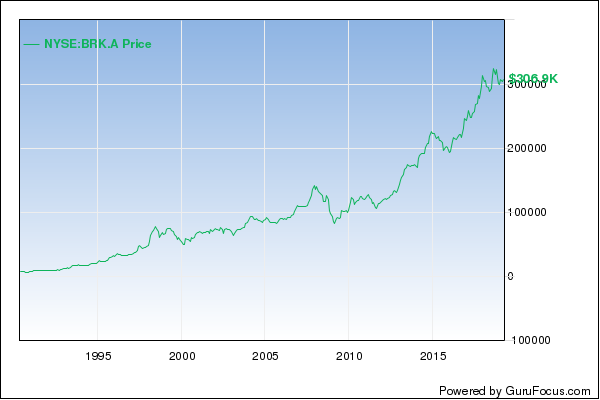Warren Buffett and Insurance
- By Rupert Hargreaves
It is well-known that Warren Buffett (Trades, Portfolio)'s favorite business sector is insurance.
Insurance companies were the first businesses he added to Berkshire Hathaway (NYSE:BRK.A) (NYSE:BRK.B) when he took over the company and started looking for other operations to diversify the business and reinvest cash flows into.
Warning! GuruFocus has detected 3 Warning Sign with BRK.A. Click here to check it out.
The intrinsic value of BRK.A
He has completed a steady stream of acquisitions in the sector ever since, building Berkshire Hathaway into one of the world's largest insurance groups.
But why is the Oracle of Omaha so attracted to insurance? In his past letters to investors, he provided us with some insight.
Buffett and insurance
In 1977, he told investors that "Insurance companies offer standardized policies which can be copied by anyone." He went on to say they have no "important advantages from trademarks, patents, location, corporate longevity, raw material sources etc." They are very competitive businesses with almost no competitive advantage.
Buffett has built his reputation on seeking out businesses with wide and deep moats, which cannot be disrupted easily. Therefore, it is strange he is attracted to an industry that has no such advantages.
Management has a large part to play. When writing about Berkshire Hathaway's insurance operations in his letters to investors in 1979 and 1980, Buffett outlined how management at the conglomerate's insurance operations were helping it achieve fantastic results. In 1979, he wrote:
"We hear a great many insurance managers talk about being willing to reduce volume in order to underwrite profitably, but we find that very few actually do. Phil Liesche [manager of Buffett's National Indemnity Company] is an exception: If business makes sense, he writes it; if it doesn't, he rejects it."
Then in 1980, when talking about Berkshire's rapidly expanding insurance operations:
"On this score, we simply couldn't feel better. GEICO represents the best of all investment worlds -- the coupling of a very important and very hard to duplicate business advantage with an extraordinary management who skills in operations and matched by skills in capital allocation."
Buffett added in 1982:
"GEICO continues to be managed with zeal for efficiency and value to the customer that virtually guarantees unusual success. Jack Byrne and Bill Snyder are achieving the most elusive of human goals -- keeping things simple and remembering what you set out to do."
So while most insurance companies lack any competitive advantages, those with a strong management team heading up the business have the potential to achieve unusual success. It is these companies that Buffett has wasted no time in adding to his portfolio.
Buffett and his float
The primary reason why the Oracle of Omaha has sought out insurance businesses is that they have one trait almost no other company has: float.
Here's how Buffett described this unique trait in his 2009 letter to investors:
"Insurers receive premiums upfront and pay claims later. ... This collect-now, pay-later model leaves us holding large sums -- money we call "float" -- that will eventually go to others. Meanwhile, we get to invest this float for Berkshire's benefit...
If premiums exceed the total of expenses and eventual losses, we register an underwriting profit that adds to the investment income produced from the float. This combination allows us to enjoy the use of free money -- and, better yet, get paid for holding it...
Our float has grown from $16 million in 1967, when we entered the business, to $62 billion at the end of 2009."
This float is effectively a large pool of capital Buffett is being paid to manage, much like a hedge fund, though there are no outside investors to please. By investing this capital in high-quality businesses, Buffett has been able to generate outstanding investment returns. Other investment companies have struggled to achieve the same kinds of returns. Buffett thinks this is because most insurance businesses lack the high-quality management that is required to run an efficient and economic operation. As he wrote in the 2009 letter:
"In most years, premiums have been inadequate to cover claims plus expenses. Consequently, the industry's overall return on tangible equity has for many decades fallen far short of that achieved by the S&P 500. Outstanding economics exist at Berkshire only because we have some outstanding managers running some unusual businesses."
Disclosure: The author owns shares of Berkshire Hathaway.
Read more here:
Warren Buffet's Big Banks Slump as Yield Curve Begins to Invert
5 Entertainment Companies Gurus Agree On
This article first appeared on GuruFocus.
Warning! GuruFocus has detected 3 Warning Sign with BRK.A. Click here to check it out.
The intrinsic value of BRK.A

